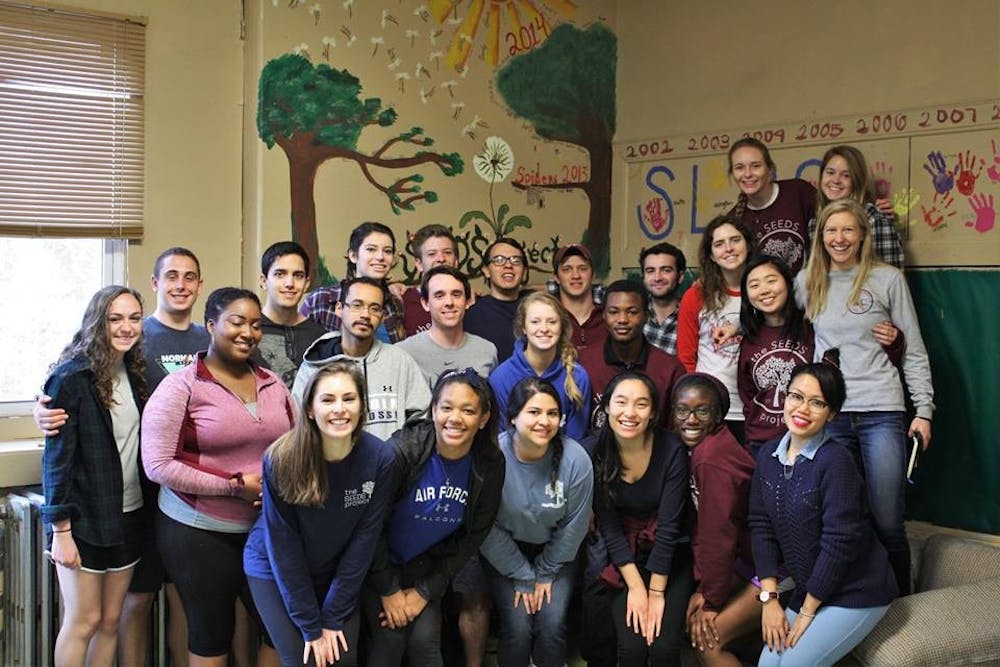Spring break: a post-midterm week of relief where university students are free to tell their Netflix accounts, “Yes, I am still watching,” without feeling guilty about procrastinating amid a seemingly endless flood of schoolwork. But every year, about 40 students use their week of freedom to engage with communities in need while receiving hands-on education through the SEEDS Project.
Students in the SEEDS (Students Engaging and Enacting Dialogue on Service) Project participate in service trips that have a common theme of community and identity in each location visited. Students who took part in this year’s trips were surprised to find they had formed a close-knit bond with their peers that was spurred by the conversations that took place throughout the week.
Sophomore Kobie Crosley said that the discussions the group had on the trip were some of the best discussions he had ever had amongst a group of Richmond students.
“Having a strong group of students with different personalities made the conversations so much more engaging,” Crosley said. “I wasn't expecting to be as drawn to the people I went on the trip with, but I'm very glad we developed such a genuine connection over the break.”
The program, now in its 10th year on campus, originally began as a disaster-relief team formed by a few Bonner scholars in response to Hurricane Katrina in 2006. Since then, it has become an organization that is not just focused on service but on learning as well, and has expanded to include West Virginia.
SEEDS is an entirely student-run organization. Marie Fernandez, a junior who serves as president of the project, enjoys having complete freedom in planning the trips, which focus on socioeconomic and environmental issues.
“It’s completely from the students’ perspective, with students planning trips for students,” Fernandez said. “That’s what makes it so unique.”
West Virginia
The group that went to West Virginia spent four days in McDowell County, where students renovated homes and spoke with the locals to learn about the area. The group saw extreme poverty, but it also came to understand how tied the people were to the coal-mining culture.
“I thought it was unlike anywhere I had been before in the United States,” sophomore Rocío Posada said. “There were scattered, run-down houses on the mountain sides. It was so isolated.”
The second part of the week was spent in Morgantown, capital of the state and a booming industrial center. There, the group met with an environmental ethicist and another historian who help explained the economic disparity between the two areas the students had visited.
Posada said that she felt most connected to the experience when the students discussed why they had originally attended and what they had gotten from their experience.
Enjoy what you're reading?
Signup for our newsletter
“One student mentioned how we should not just be enlightened and feel good about ourselves, but we should realize how we can do something about it,” Posada said. “I felt close to the group at that point because we all shared the same interests.”
Louisiana

The trip to Louisiana was focused on how ties to a community can be tangible and intangible at the same time.
Their group began in Dulac County, on the Bayou. The students visited a Native-American community that is not federally recognized. They spent time discussing how the Natives do not have much tangible ownership of the land, but intangibly are connected to the area and do not want to leave, even though it is eroding and they do not receive financial assistance.
This meshed well with the second part of the trip, during which students visited New Orleans to discuss racial relations.
The most memorable moment for Crosley was when the group met with both a doctor and graduate students from Louisiana State University to discuss systematic racism and its impact on gun violence in New Orleans. He said that the conversation was so passionate that he was active the entire time, even though they were in a classroom for almost 3 hours.
Catherine Cunha, who helped plan the Louisiana trip, said that she had thought the trip exceeded everyone’s expectations because they had known they were going to have their views expanded on cultural and service issues, but she had not expected them to become so emotionally invested.
Another senior, Taylor Maiorana, who helped plan the West Virginia trip and has been involved with SEEDS for 3 years, was sad to see it come to an end, but knows that the relationships she made will continue.
“Even though I’m graduating, I anticipate the bonds I’ve made with my fellow SEEDlings will last far beyond my college years,” Maiorana said. “I’m so excited to watch the SEEDS project expand in a big way in the years to come.”
Contact sports editor Jennie Trejo at jennifer.trejo@richmond.edu
Support independent student media
You can make a tax-deductible donation by clicking the button below, which takes you to our secure PayPal account. The page is set up to receive contributions in whatever amount you designate. We look forward to using the money we raise to further our mission of providing honest and accurate information to students, faculty, staff, alumni and others in the general public.
Donate Now



